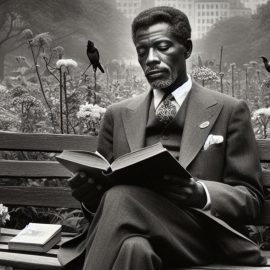

This article is an excerpt from the Shortform book guide to "Karma" by Sadhguru. Shortform has the world's best summaries and analyses of books you should be reading.
Like this article? Sign up for a free trial here.
How are karma and reincarnation linked? What does karma have to do with past lives?
Karma and reincarnation are related because karma influences how we are reincarnated, and because of reincarnation, we inherit karma from past lives. Understanding the tie between these two concepts can deepen your understanding of karma whether or not you believe in reincarnation.
Continue reading for more on the relationship between karma and reincarnation.
The Relationship Between Karma and Reincarnation
To fully understand karma, we need to understand how karma and reincarnation are related.
Reincarnation is a continuous process where the energy body, the nonphysical sheath linked to the body and mind, takes on various forms across different lifetimes depending on the karma accumulated in previous lives. The actions and decisions you take in your current life set the trajectory for future lives. Reincarnation is a progressive journey where each life, influenced by your karma, presents opportunities for growth and learning. However, as long as you keep accumulating karma, you remain stuck in the cycle of reincarnation. But if you successfully release yourself from karma, then you can escape the endless wheel of life, death, and rebirth.
(Shortform note: For some, this description of the “energy body” that gets reincarnated might seem reminiscent of the Judeo-Christian idea of the soul. However, in his teachings, yogi Sadhguru emphasizes that they’re different. He argues that the idea of a soul is an illusion, rooted in our attachment to the existence of an individual, unique self. According to Sadhgruru, the part of us that gets reincarnated is just a piece of a larger cosmological order that’s only sometimes embodied, different from the concept of a self-contained, individual soul.)
You don’t need to believe in reincarnation to benefit from a deeper understanding of karma. Spiritual truths, including concepts like reincarnation, should come from a place of inner experience and realization rather than mere belief.
| Is There Evidence to Support the Idea of Reincarnation? A belief in reincarnation is prevalent across numerous religions and cultures. However, there’s little empirical or scientific evidence to support it. Some have offered anecdotal evidence to support the existence of reincarnation. In Many Lives, Many Masters, psychologist Brian Weiss writes about therapy sessions with his patient “Catherine,” who recounted details from alleged past lives while under hypnosis. Despite Weiss’s initial skepticism, his sessions with Catherine led him to believe that reincarnation is real and that a part of us does exist outside the bounds of the body. However, Weiss’s conclusions aren’t widely accepted as proof of reincarnation. Many scientists argue that supposed past-life recollections are more likely elaborate products of the human mind intensified by hypnosis. Others propose the possibility of “cryptomnesia,” a condition where a person recalls long-forgotten memories and mistakes them for new ones. Furthermore, critics of reincarnation have highlighted a logical problem in the idea. In Reincarnation: A Critical Examination, Paul Edwards points out that human consciousness relies on a living, physical brain. Since the brain dies when the rest of the physical body dies, he argues there’s no way for any consciousness to survive beyond physical death, let alone reincarnate into a different body. |

———End of Preview———
Like what you just read? Read the rest of the world's best book summary and analysis of Sadhguru's "Karma" at Shortform.
Here's what you'll find in our full Karma summary:
- Yogi Sadhguru's guide to understanding and living by karma
- The four types of karma and how they impact you
- Strategies for those who wish to release themselves from the cycle of karma






